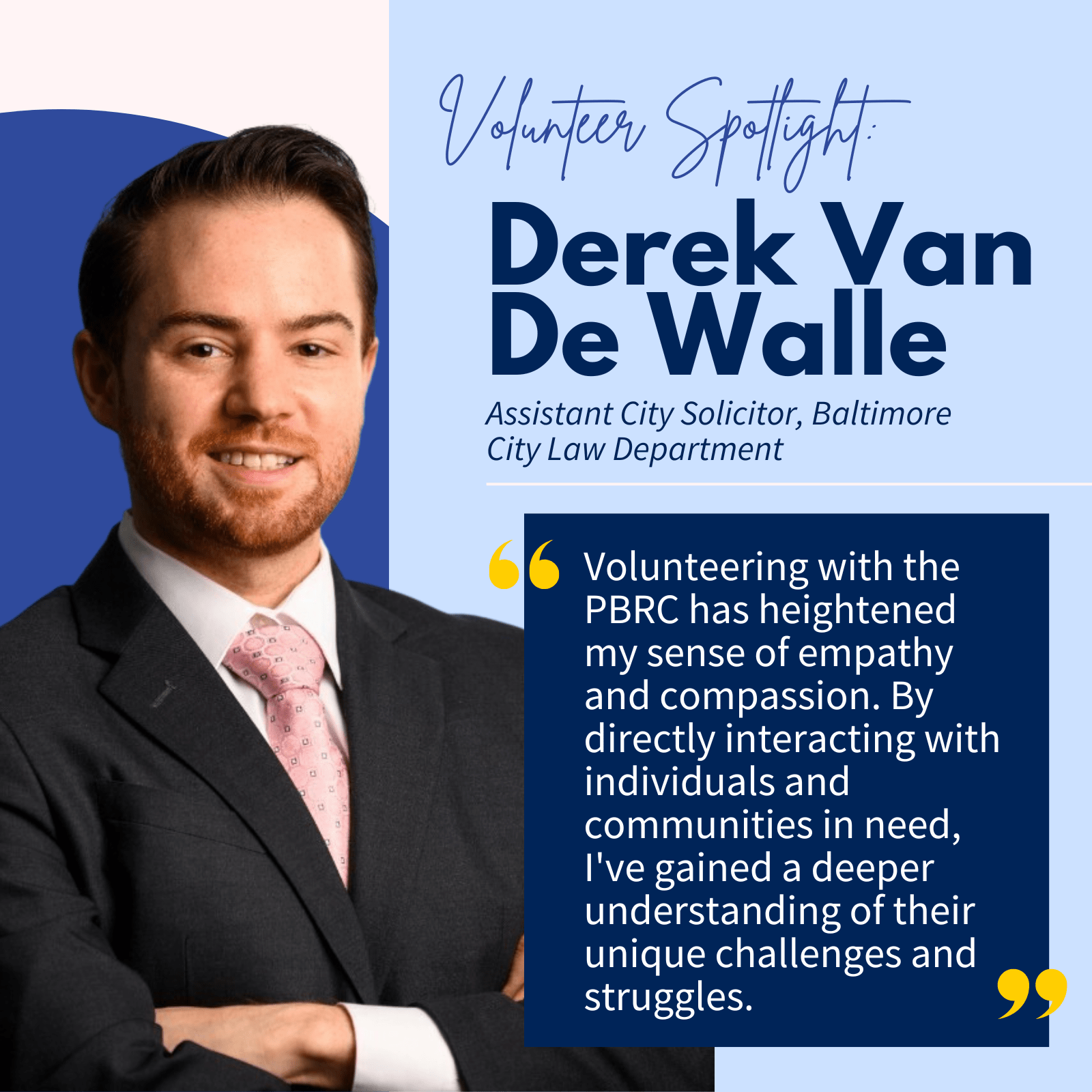Volunteer Profile: Derek Van De Walle, Esq.
 What brought you to begin and continue to build your legal career in Maryland?
What brought you to begin and continue to build your legal career in Maryland?
I was fortunate that my first job out of law school was as a judicial law clerk at the District Court in Baltimore City. I then clerked at the Court of Special Appeals (now Appellate Court of Maryland) and returned to Baltimore to work in private practice before coming to the Baltimore City Law Department. Baltimore has always been the epicenter of the legal community in Maryland, and I believe that continues to this day.
Aside from my career, there have been two common denominators throughout this period binding me to Baltimore. When I first moved to Baltimore, I joined the Bar Association of Baltimore City and became involved in their Young Lawyers’ Division. I am not a native of Baltimore or even Maryland, nor did I attend either law school in the state, so I was fortunate to find a sense of community through the BABC. Second, during my first year in Baltimore I met my (now) wife, Gina, who is a native of the area, and we’ve made Baltimore City our home.
Can you tell me a little about your practice?
I defend the City of Baltimore as an Assistant City Solicitor in the Law Department. I handle all types of civil lawsuits in trial and appellate courts, including personal injury, property damage, contract claims, and claims involving constitutional and civil rights. Because I litigate, I have a soft spot for the PBRC’s estate planning services; drafting a last will and testament for a client provides a respite from the adversarial nature of litigation.
Which of PBRC’s projects do you volunteer with, and how did you get involved?
My volunteerism began when I was accepted as a Fellow in the PBRC’s Professional Skills Academy for the 2022-2023 year. As a Fellow, I was able to volunteer with each of the projects PBRC offers: Eviction Prevention, Debt Defense, Home Preservation, and Immigrant Legal Assistance. The structure of the Academy enabled me to stay on track of volunteering at numerous clinics throughout the year
What do you find interesting about this work?
Every volunteer opportunity can present a new challenge that makes the work interesting. A new issue can arise while volunteering, and so there is always something new to learn at a clinic. This could be legal, such as a novel affirmative defense in Rent Court, or factual, like crafting a last will and testament around a client’s unique familial situation.
What, if anything, did you find surprising about volunteering at community clinics or in-court? What has been rewarding? What, if anything, has been frustrating?
Generally, the clinics provide same-day services and last either a half-day or full-day. So you’re able to end the day knowing you’ve accomplished something, whether it's a dismissal of a failure to pay rent case, a settlement agreement for debt collection, or an executed will and advanced medical directive, and that is rewarding for both the volunteer attorney and the client.
It can be frustrating how often attorneys and judges misunderstand the role of the volunteer attorney. They tend to see our role as merely a delay tactic, but both attorneys and judges alike have to acknowledge that all individuals are entitled to legal representation if they so choose. Additionally, they don’t see how the results we achieve can positively affect the client’s life, particularly when these results are achieved outside of the courtroom.
What did you find helpful/interesting about PBRC’s process?
I’ve found that many volunteer attorneys with the PBRC volunteer for clinics outside of their general practice. One simple reason for this is that PBRC provides wonderful training opportunities for attorneys to prepare themselves for each clinic. Each training is recorded and available online, so I can rewatch the training if I haven’t volunteered for that particular clinic for some time. The PBRC also provides checklists, relevant statutes, and forms that accompany the training. Further, the clinics themselves are always well-staffed and the attorneys and paralegals are able to assist with any sudden questions.
How has doing pro bono work changed you?
Volunteering with the PBRC has heightened my sense of empathy and compassion. By directly interacting with individuals and communities in need, I've gained a deeper understanding of their unique challenges and struggles. This firsthand experience has broadened my horizons and reminded me of the importance of using my abilities to contribute positively to society. This experience has not only changed how I view my role in society but has also solidified my commitment to continue contributing my time and expertise to meaningful causes.
What message would you give to attorneys thinking about volunteering?
Every attorney should engage in some pro bono work. Attorneys have historically played a significant leadership role within their communities. Thus, as someone who is licensed to practice law, you have knowledge and skill set who can guide and influence various aspects of the community's well-being. Volunteering can be incredibly fulfilling, and the work you will do has the potential to create positive change in the lives of individuals, communities, and causes that need it most.
I think a major obstacle in performing pro bono work is the hesitation to engage in a new practice area. Those fears should be allayed for two reasons. First, the PBRC provides training, resources, and mentorship for attorneys who are new to volunteering. Second, consider how far you’ve come since you started to practice. At some point you graduated law school, knowing very little about actually practicing the law, and then entered practice for the first time; you may have changed practices at some point. You can easily do it again and build on the skill set you have to succeed.
For more information about volunteering in Maryland, please contact: education@probonomd.org





